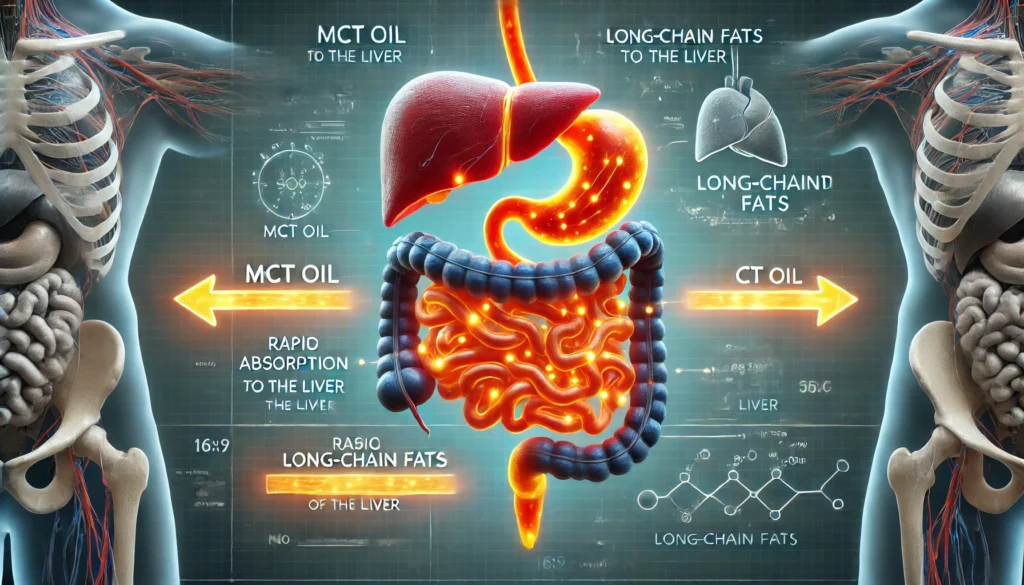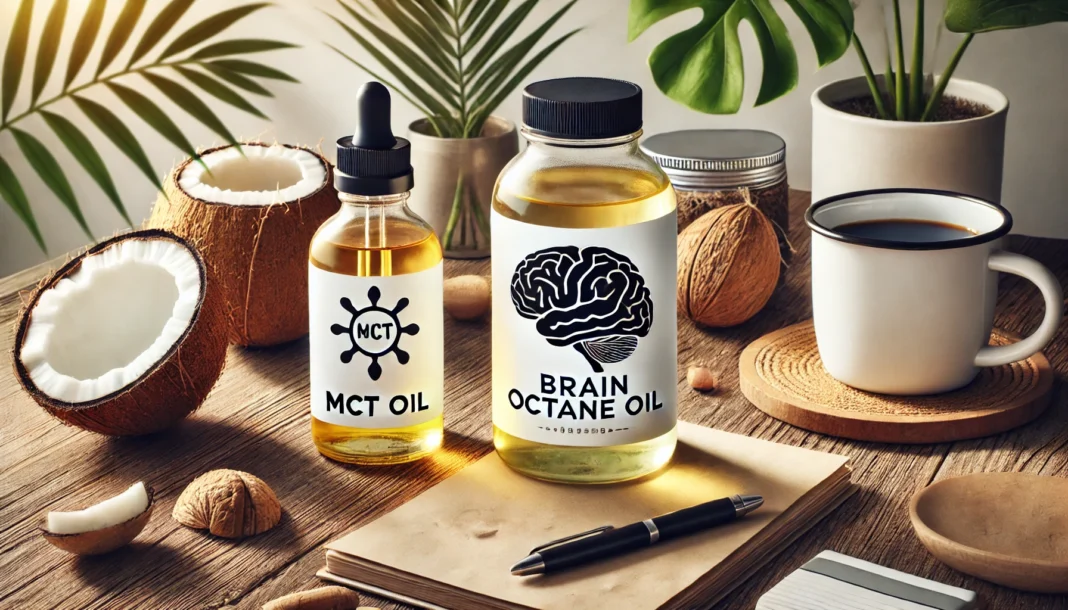Introduction
In recent years, the spotlight on dietary fats has shifted dramatically. Once vilified, fats are now recognized as essential to metabolic health, cognitive performance, and hormonal balance. Among the most discussed fats in this nutritional renaissance are medium-chain triglycerides (MCTs), and more specifically, Brain Octane oil. But with the rising popularity of both MCT oil and its refined counterpart, consumers are left wondering: what are the real differences in the debate of Brain Octane oil vs MCT oil? Are they interchangeable, or does one offer a superior edge in performance, clarity, and fat metabolism?
You may also like: MCT Oil for Dementia and Brain Health: Exploring Its Role in Memory, Function, and Alzheimer’s Support
This article delves deep into the biochemistry, clinical insights, and consumer experiences surrounding these two trending oils. We’ll explore the origins, formulation, metabolic mechanisms, and functional differences between Brain Octane oil vs MCT, offering clear guidance for individuals looking to enhance energy, cognitive function, weight loss, or general wellness. Whether you’re a ketogenic dieter, biohacker, athlete, or simply someone seeking mental sharpness without stimulants, understanding how to navigate the Brain Octane oil vs MCT oil decision is crucial. With the help of research-backed analysis, this guide will empower you to choose the right fuel for your mind and body.

Understanding MCT Oil: Composition and Mechanism
MCT oil is a concentrated source of medium-chain triglycerides—fats that are uniquely structured to be metabolized quickly by the body. Most dietary fats are long-chain triglycerides (LCTs), which take longer to digest and are more likely to be stored as fat. In contrast, MCTs are absorbed rapidly and transported directly to the liver, where they are converted into ketones. These ketones act as an efficient alternative energy source, particularly for the brain and muscles.
Traditional MCT oil typically contains a mixture of four different fatty acids: caproic acid (C6), caprylic acid (C8), capric acid (C10), and lauric acid (C12). Each of these has slightly different metabolic properties, with C6 being the fastest to convert to ketones but often causing gastrointestinal distress, and C12 behaving more like a long-chain fat with antimicrobial benefits.
The majority of commercial MCT oil products include varying ratios of C8 and C10. While both are effective at boosting ketone production, C8 (caprylic acid) is often considered the most ketogenic due to its efficiency in ketone generation and ease on digestion. Understanding this helps frame the deeper debate of Brain Octane oil vs MCT oil, as we explore what sets Brain Octane apart.

What Is Brain Octane Oil and How Is It Different?
Brain Octane oil is a specialized form of MCT oil that consists exclusively of C8 caprylic acid. Developed and popularized by Dave Asprey and the Bulletproof brand, Brain Octane oil is distilled to eliminate all other MCTs, resulting in a product that delivers pure, fast-acting ketone energy.
This purity makes Brain Octane oil especially appealing for individuals seeking cognitive benefits, metabolic optimization, or enhanced athletic performance. By eliminating C6 (which can cause digestive upset) and C10/C12 (which convert more slowly or act more like traditional fats), Brain Octane oil provides a clean, reliable boost to ketone production without the digestive complaints associated with some broader-spectrum MCT oils.
One key argument in the Brain Octane oil vs MCT oil comparison lies in how these products affect mental performance. Brain Octane’s rapid absorption and conversion to ketones offer nearly immediate cognitive enhancement, helping users bypass the typical brain fog or energy crashes associated with carbohydrate metabolism. The simplicity of its composition is not just a marketing gimmick—it reflects a precision-tuned formulation optimized for fast energy and brain fuel.

Brain Octane Oil vs MCT Oil in Ketosis Support
Both Brain Octane oil and general MCT oil are valued tools in ketogenic nutrition. They facilitate a state of ketosis by increasing circulating ketones, which the body uses as a primary energy source in the absence of carbohydrates. But in comparing Brain Octane oil vs MCT oil, a clear distinction arises in the speed and efficiency of ketone production.
Because Brain Octane oil contains only C8, it rapidly raises ketone levels without needing carb restriction or fasting. This makes it ideal for those easing into ketosis, intermittent fasters, or individuals looking to extend ketone benefits without a strict ketogenic diet. Standard MCT oil, while effective, may require longer digestion and can sometimes cause digestive side effects when taken in larger doses.
The metabolic edge of Brain Octane oil vs MCT oil becomes even more apparent in clinical settings. C8 has been linked to improved mitochondrial function and greater increases in blood ketone levels compared to C10 or mixed MCT oils. This efficiency not only accelerates entry into ketosis but also supports longer periods of mental and physical energy, making Brain Octane oil the preferred choice for fasted workouts, long meetings, or high-output workdays.
Brain Octane Oil vs MCT: Cognitive Performance and Brain Fog
Many users report using Brain Octane oil specifically for mental clarity and the reduction of brain fog. These subjective experiences are increasingly supported by emerging neuroscience research that underscores ketones’ role as neuroprotective agents and efficient brain fuel.
In the Brain Octane oil vs MCT comparison, Brain Octane consistently earns higher marks for cognitive support due to its exclusive C8 content. Studies have shown that ketones derived from caprylic acid not only cross the blood-brain barrier efficiently but also fuel neurons in a way that enhances synaptic plasticity, learning, memory, and overall executive function.
Additionally, for those who suffer from cognitive dips due to blood sugar crashes or poor sleep, the fast-acting ketones from Brain Octane oil offer a smoother, more stable form of energy. While MCT oil also supports cognitive performance, its mixed composition often results in slower and less predictable effects. Brain Octane’s singular focus on clean, rapid brain fuel makes it the go-to supplement for professionals, students, and individuals with high mental demands.
Fat Loss, Satiety, and Energy: Performance-Based Comparisons
Another critical axis in the Brain Octane oil vs MCT oil debate involves fat loss and metabolic efficiency. While both oils enhance fat burning and thermogenesis, the differences in their mechanisms and user experiences are worth examining.
C8-rich Brain Octane oil has been shown to increase satiety hormones like peptide YY and leptin, reduce appetite, and promote thermogenic energy expenditure. Its ability to raise ketone levels quickly also helps suppress cravings and maintain energy stability during calorie restriction. When used consistently, Brain Octane oil becomes a powerful ally in weight management—especially when combined with intermittent fasting or low-carb diets.
In contrast, traditional MCT oils, particularly those containing higher amounts of C10 or C12, offer milder fat loss benefits. They still contribute to energy and metabolic rate but may be less potent in appetite suppression or ketone generation. Individuals who find MCT oil causes digestive discomfort often switch to Brain Octane oil for a smoother, more reliable experience.
Digestive Tolerance and Daily Usage
For many users, ease of digestion is a major consideration when choosing between Brain Octane oil vs MCT oil. Because MCT oil includes a wider spectrum of fatty acids, it can sometimes lead to bloating, cramping, or diarrhea—especially when consumed in large quantities or without food. This is particularly true for products containing C6, which is the shortest and most volatile MCT.
Brain Octane oil avoids these issues by excluding C6 and focusing solely on C8, which is well-tolerated by most users even at higher doses. Its smooth digestibility makes it suitable for daily use, whether blended into coffee, added to smoothies, or taken straight by the spoonful. This is a key reason why individuals transitioning from MCT oil often report better experiences with Brain Octane.
In practical terms, the best approach for anyone exploring the benefits of these oils is to start with small doses—regardless of the product—and gradually build up to a tolerable and effective amount. Paying attention to personal digestive feedback can guide the choice between the broader-spectrum MCT and the targeted precision of Brain Octane.

Ingredient Sourcing, Purity, and Environmental Impact
Another layer to the Brain Octane oil vs MCT oil conversation involves sourcing and environmental responsibility. Brain Octane oil is typically derived from 100% coconut oil and is free of palm oil derivatives. This distinction is critical for those concerned with deforestation and sustainability, as palm oil harvesting has been linked to significant environmental damage.
Many MCT oils on the market blend coconut and palm sources, which may affect both ethical sourcing and product purity. Bulletproof, the company behind Brain Octane, emphasizes third-party testing, transparency, and sustainable practices—elements that align with the values of health-conscious and eco-conscious consumers.
Those who prioritize clean-label supplements and minimal environmental footprint may find that Brain Octane oil’s meticulous sourcing and refinement processes provide additional value beyond its physiological effects.
Cost vs Value: Is Brain Octane Worth It?
In comparing Brain Octane oil vs MCT oil, price often becomes a determining factor. Brain Octane oil tends to cost more per ounce than standard MCT oils due to its specialized distillation, exclusive use of C8, and premium branding. However, when evaluating value rather than just cost, the calculation becomes more nuanced.
If an individual’s goals include enhanced mental clarity, ketogenic efficiency, and appetite control—with minimal digestive side effects—then Brain Octane oil often delivers higher performance per dose. In many cases, users find they need less Brain Octane to achieve their desired effect, offsetting the higher upfront cost with greater long-term efficiency.
On the other hand, individuals simply seeking to boost overall fat intake or support general metabolic health may find that a high-quality MCT oil with a favorable C8:C10 ratio meets their needs at a more accessible price point. Ultimately, the choice depends on health goals, budget, and personal response to each product.
Final Verdict: Brain Octane Oil vs MCT Oil
Choosing between Brain Octane oil vs MCT oil requires an understanding of personal health objectives, sensitivity to different MCTs, and willingness to invest in higher-purity formulations. For those prioritizing rapid ketone production, mental focus, and digestive ease, Brain Octane oil emerges as the superior choice. Its targeted formulation, high bioavailability, and positive impact on energy and cognition make it a standout in the performance nutrition space.
However, for users more focused on general wellness, budget-friendliness, or incremental fat-burning support, a well-formulated MCT oil can still be a valuable addition to a healthy lifestyle. Both products have their place, and neither is inherently better—it’s all about alignment with your unique physiology and performance demands.
Frequently Asked Questions
1. What’s the biggest difference between Brain Octane oil vs MCT oil?
The primary difference lies in composition. Brain Octane oil contains only C8 (caprylic acid), the most ketogenic and fast-absorbing MCT. Traditional MCT oil includes a blend of C8, C10, and sometimes C12, resulting in slower ketone production and varying effects. Brain Octane’s purity gives it a more rapid and predictable performance edge, especially for brain fuel and fasting protocols.
2. Can I use Brain Octane oil if I’m not on a keto diet?
Yes, Brain Octane oil benefits non-keto users by enhancing mental clarity and providing an alternative energy source to glucose. It’s commonly used in intermittent fasting, paleo, or low-carb lifestyles. Even standard diet followers can enjoy its brain-boosting and appetite-controlling properties without being in full ketosis.
3. Is there a risk of digestive upset with either oil?
Digestive tolerance varies. MCT oil can cause bloating, cramping, or diarrhea—especially if it contains C6 or if users start with large doses. Brain Octane oil, made only from C8, is gentler and generally better tolerated. Starting with small amounts and gradually increasing intake can minimize side effects.
4. Which oil is better for cognitive enhancement?
In the Brain Octane oil vs MCT oil debate, Brain Octane often wins for cognitive support due to its pure C8 content. C8-derived ketones fuel the brain more efficiently, cross the blood-brain barrier easily, and support mental focus, memory, and productivity.
5. Can athletes benefit from using Brain Octane oil?
Absolutely. Brain Octane oil supports athletic performance by supplying fast, clean fuel without raising insulin levels. It can enhance endurance, reduce fatigue, and extend the fat-burning window during workouts. Many athletes use it during fasted training or as part of a performance-focused ketogenic plan.
6. How should Brain Octane oil be used daily?
Most users add Brain Octane oil to coffee, tea, or smoothies in the morning. A common starting dose is 1 teaspoon, building up to 1–2 tablespoons per day as tolerated. Avoid heating it at high temperatures, as this can degrade its structure.
7. Are there any environmental benefits to Brain Octane oil?
Yes. Brain Octane oil is derived from 100% coconut oil, avoiding palm oil, which is often linked to deforestation. Bulletproof also emphasizes sustainable sourcing and third-party quality testing, which appeals to environmentally conscious consumers.
8. Does Brain Octane oil help with weight loss more than MCT oil?
Brain Octane oil may be more effective for weight loss due to its rapid ketone production, appetite suppression, and thermogenic effects. However, MCT oil can also aid fat loss, especially when combined with a calorie-controlled or low-carb diet. The best results come from consistent use and dietary alignment.
9. Is there a taste difference between the two oils?
Both oils are flavorless and odorless when pure. Brain Octane oil has a slightly smoother texture, which some users prefer in beverages like coffee. Lower-quality MCT oils may have off tastes or emulsification issues if not properly blended.
10. Should I choose Brain Octane or stick with MCT oil?
If your goals include sharper mental performance, quick ketosis, and minimal digestion issues, Brain Octane is likely worth the investment. If your aim is general wellness, cost-effective fat supplementation, and basic metabolic support, MCT oil may suffice. Personal experimentation is the best way to determine which oil works best for you.

Conclusion
When it comes to Brain Octane oil vs MCT oil, the decision hinges on your priorities. Brain Octane oil offers a more refined, targeted approach to energy, cognition, and ketone production. It is the premier choice for biohackers, intermittent fasters, and those seeking elite mental performance. MCT oil, meanwhile, remains a solid entry point for those new to functional fats or looking to support general wellness.
With clear scientific differences, well-documented benefits, and growing consumer awareness, both Brain Octane and MCT oil have carved distinct niches in the health world. By aligning product choice with your personal goals—be it fat loss, brain clarity, or metabolic control—you can make an empowered decision that fuels your body and mind.
Was this article helpful? Don’t let it stop with you. Share it right now with someone who needs to see it—whether it’s a friend, a colleague, or your whole network. And if staying ahead on this topic matters to you, subscribe to this publication for the most up-to-date information. You’ll get the latest insights delivered straight to you—no searching, no missing out.
Further Reading:
Does MCT Oil Increase LDL Cholesterol? A Scientific Look at Its Real Impact on Heart Health
Does MCT Oil Go Bad? How Long It Lasts, Spoilage Signs, and Shelf Life Tips



